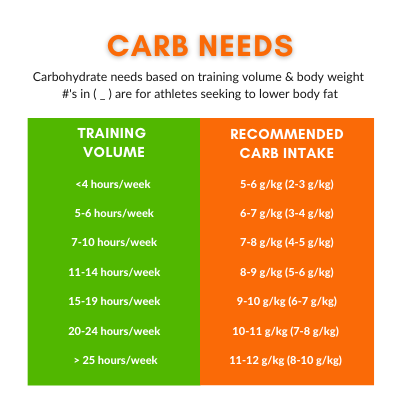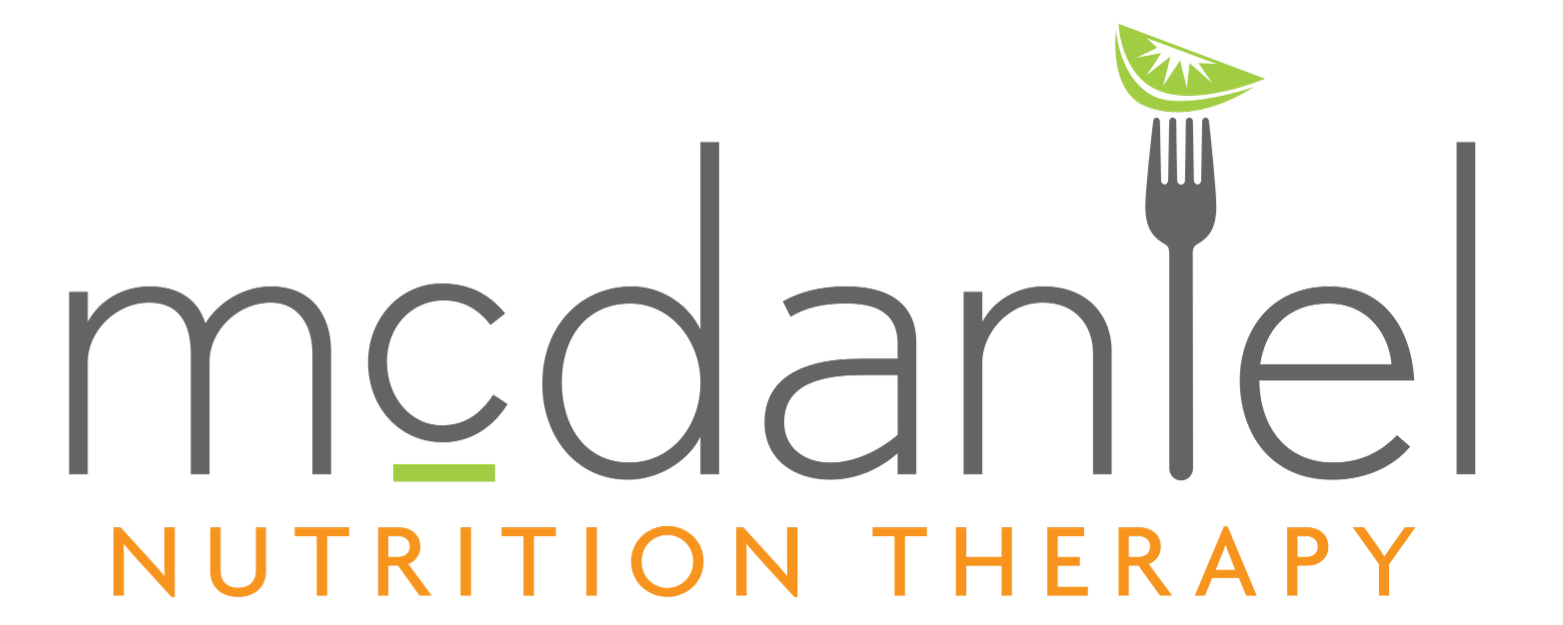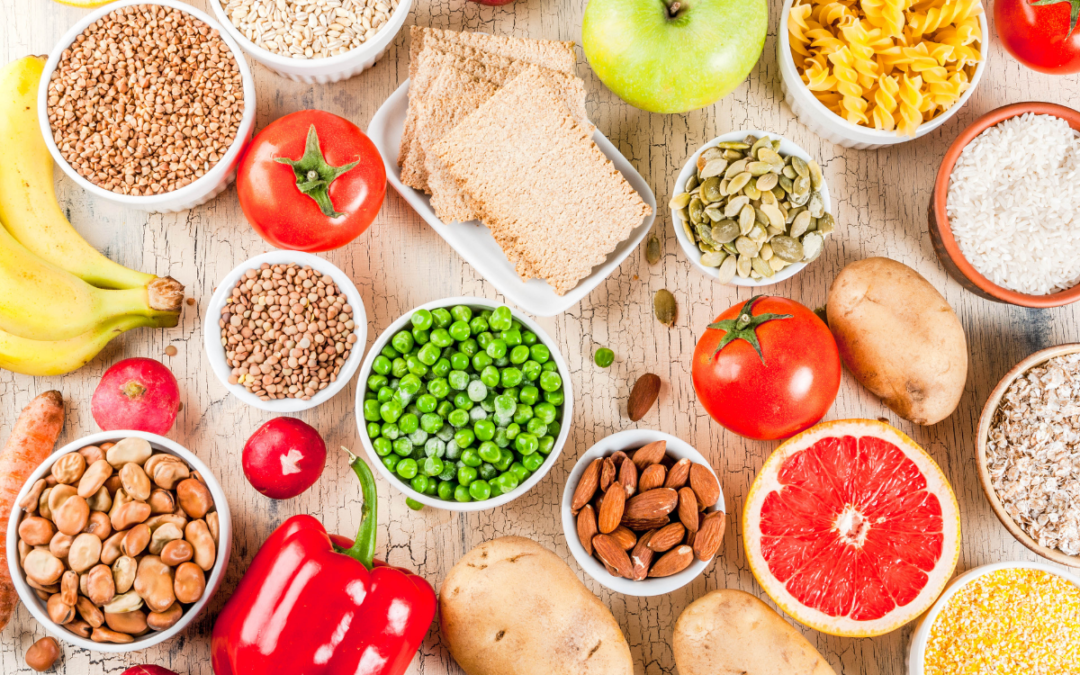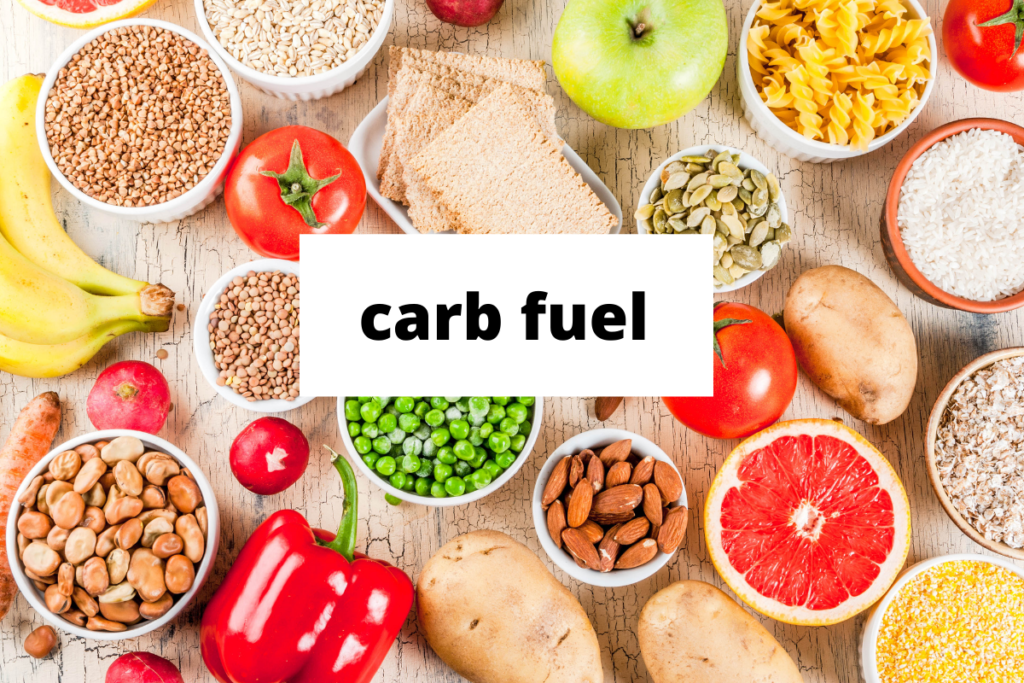When it comes to the endurance athlete, carb fuel is king (or queen)! Quite often, our sports dietitians get the question from our clients: how do I know if I’m getting enough or even too much? This question is an important one to answer as carbs are critical for everyday fuel as well as to support training adaptations from endurance training. Our carb needs are based on a few key pieces of information:
- how much you’re training (often measured in hours per week)
- your body weight
- body composition goals
See the chart below to help demonstrate the current evidence on how to calculate those goals.

If you wanted to know how many grams of carb you were eating, the easiest way to obtain that information would be by journaling your foods in an app like My Fitness Pal. For the curious or data-driven athlete, this can be useful information. But, not all athletes desire to track or find it mentally “healthy” to do so. Plus, it’s super time-consuming!
Luckily, our bodies are wise and offer us many clues into proper energy and carb fuel information. And, gentle reminder, it does require listening and tuning in!
Here are 4 ways to know if you’re getting enough cards in your diet without counting your carbs!
4 ways to know you’re eating enough carbs while endurance training:
Your workouts are strong and you recovery easily from workout to workout.
As volume or intensity increases in your training plan, a solid clue that you are fueling correctly is that you’re recovering. Specific examples might include feeling mentally and physically energized and performance goals such as power wattage on a bike or running times are met.
You’re hungry before mealtimes, but don’t find yourself TOO hungry around or between mealtimes.
Hunger and fullness are one of the simplest ways to know if you’re eating enough. Pay attention to your hunger cues. If you find yourself hungry at random times such as hunger in the middle of the night or throughout the day, you likely need more fuel. Have you heard of “intuitive eating?” Intuitive eating is a dietary concept that promotes listening to your body and your instincts, and being able to decide what-, when-, and how much- to eat. However, intuitive eating looks different for everyone, especially for athletes. Athletes might find that in order to carb load appropriately for a long workout that they need to eat even when they don’t feel hungry. Examples of this might be an early morning pre-fuel meal or post-workout recovery drink.
You maintain a normal menstrual cycle.
While the absence of your menstrual cycle due to training might seem “appealing,” it’s a major warning sign that you’re not fueling appropriately. Absence of periods (called amenorrhea) can be linked to serious health problems, such as bone loss, almost a three times higher incidence of stress fractures, infertility and osteoporosis (in the future). If your period is lighter or you’ve missed it, the answer may lie in not eating enough. Inadequate fuel causes your cycle to change in order to conserve energy. FYI – if you’re using contraceptives, you won’t be getting this feedback.
You’re staying healthy (immunity-wise).
Athletes experience a more regular cycle of psychological distress on their body and their systems. There has been increasing data to support that certain pathways involving the immune system in athletes that are sensitive to nutritional influences. It has been proven that carbohydrate supplementation has the strongest scientific support, in which it reduces post-exercise stress hormone levels, inflammation, fatty acid mobilization, as well as oxidation (1).
Enjoy the Additional Carb Fuel!
One of the many pleasures of training is getting to eat to fuel it! In addition to eating enough, remember, timing matters as well. Enjoy easily digestible carbs prior to training, such as:
- Banana + nut butter + toast
- Smoothies
- Bagels + ricotta + honey
Enjoy carbs + protein after training, such as:
- Smoothies that include a source of protein like greek yogurt or milk
- Egg sandwich on a bagel or english muffin
- Buddha bowl with grains, veggies and tofu
Train hard, eat smart, and reap the benefits!
References
- Nieman, D. C. and Mitmesser, S. H. (2017). Potential impact of nutrition on immune system recovery from heavy exertion: A metabolomics perspective. Nutrients, 9(5), 513. https://doi.org/10.3390/nu9050513
- 2. Solga, C. (2019). Basics of carbohydrate loading for sports performance. EatRight. Retrieved from https://www.eatright.org/fitness/sports-and-performance/fueling-your-workout/basics-of-carbohydrate-loading-for-sports-performance


